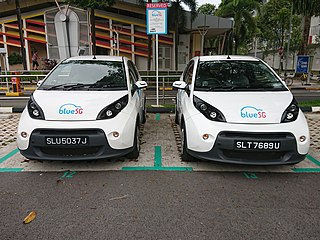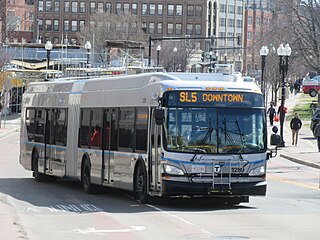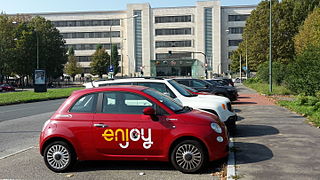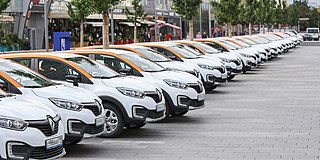A streetcar, street car, or tram is a vehicle that travels on rails, typically in a street.

Carsharing or car sharing or car clubs (UK) is a model of car rental where people rent cars for short periods of time, often by the hour. It differs from traditional car rental in that the owners of the cars are often private individuals themselves, and the car sharing facilitator is generally distinct from the car owner. Car sharing is part of a larger trend of shared mobility.

Flexcar was an American vehicle subscription company with headquarters located in Boston, Massachusetts.

Zipcar is an American car-sharing company and a subsidiary of Avis Budget Group. Zipcar provides vehicle reservations to its members, billable by the minute, hour or day; members may have to pay a monthly or annual membership fee in addition to car reservations charges. Gas, maintenance, insurance options, and a dedicated parking spot are included. Zipcar was founded in 2000 by Antje Danielson and Robin Chase.
Communauto is a Canadian carsharing company based in Montréal, Québec, Canada, that offers car-sharing services in fifteen Canadian cities and Paris, France. As of March 2018 it had 40,000 users, and a fleet of approximately 2,000 free-floating and station-based vehicles.

The Green Car of the Year is a Car of the Year award from the Green Car Journal. The winner is selected by an 11-member panel comprising automotive and environmental experts. Invited jurors have included Mario Andretti; Carroll Shelby, Jay Leno, Carl Pope, Christopher Flavin, Jonathan Lash and Jean-Michel Cousteau.

A hybrid electric vehicle (HEV) is a type of hybrid vehicle that combines a conventional internal combustion engine (ICE) system with an electric propulsion system. The presence of the electric powertrain is intended to achieve either better fuel economy than a conventional vehicle or better performance. There is a variety of HEV types and the degree to which each functions as an electric vehicle (EV) also varies. The most common form of HEV is the hybrid electric car, although hybrid electric trucks, buses, boats, tow trucks, and aircraft also exist.

RechargeIT is one of five initiatives within Google.org, the charitable arm of Google, created with the aim to reduce CO2 emissions, cut oil use, and stabilize the electrical grid by accelerating the adoption of plug-in electric vehicles. Google.org's official RechargeIT blog has not been updated since 2008.

Shared transport or shared mobility is a transportation system where travelers share a vehicle either simultaneously as a group or over time as personal rental, and in the process share the cost of the journey. It is a transportation strategy that allows users to access transportation services on an as-needed basis, and can be regarded as a hybrid between private vehicle use and mass or public transport. Shared mobility is an umbrella term that encompasses a variety of transportation modes including carsharing, Bicycle-sharing systems, ridesharing companies, carpools, and microtransit.

The Toyota Prius Plug-in Hybrid is a plug-in hybrid liftback manufactured by Toyota. The first-generation model was produced from 2012 to 2016. The second-generation model has been produced since 2016. Production of the third-generation model began in 2023.
Share Now GmbH is a German carsharing company, formed from the merger of Car2Go and DriveNow. Since 2022, it is a subsidiary of the Free2Move division of multinational automaker Stellantis providing carsharing services in urban areas in Europe, and formerly in North America. It has over four million registered members and a fleet of over 14,000 vehicles in 18 cities across Europe.

Turo Inc. is an American peer-to-peer carsharing company based in San Francisco, United States. The company allows private car owners to rent out their vehicles via an online and mobile interface in four countries and new corporate owners to rent out their cars in France in addition to the four previous countries.

GoCar is the first and leading Carsharing service in Ireland. GoCar members can book cars online or via the app for as little as an hour, then unlock with their phone; the keys are in the car, with fuel, insurance all included. Rates start from €9 per hour, with 50 km of driving included on each trip. GoCar now operates a fleet of over 1,100 vehicles across 600+ locations in Ireland. Drivers can visit GoCar.ie to request a GoCar in their community. It launched in Cork in September 2008, with the support of Cork City Council as a pilot scheme. Cork City Council gave GoCar use of 3 car parking locations in Cork City as part of a wider pilot scheme.
Peer-to-peer carsharing is the process whereby existing car owners make their vehicles available for others to rent for short periods of time.
DriveNow was a one-way carsharing service wholly owned by the automotive manufacturer BMW. In 2019, DriveNow and car2go, a carsharing service from Daimler AG, merged to form the global mobility provider Share Now, with a combined fleet of 20,000 vehicles in 31 cities in 14 countries and over four million members worldwide. Share Now is one of the five mobility services which are part of the mobility joint venture of the BMW Group and the Daimler AG.

Flexicar is a Melbourne membership-based carsharing service owned by Hertz. The company provides automobile reservations to its members, billable by the hour or day.
Community CarShare was a non-profit, carsharing co-op in southern Ontario, that was founded in 1998. It ran into financial trouble and was acquired by Vrtucar on 27 March 2018.

ReachNow was a carsharing service operated by BMW Group in Seattle, Portland, and Brooklyn. It launched in 2016 and it shut down its services in Seattle and Portland on July 17, 2019. It used a mobile app for car reservations and operated a fleet of over 1,000 vehicles. It was one of three car-sharing services in the city of Seattle, competing with car2go and Zipcar. ReachNow was similar to another BMW Group service DriveNow, but was focused on North American cities starting with Seattle. Unlike DriveNow which is a joint-venture with Sixt, ReachNow is a fully owned BMW subsidiary, with RideCell rather than Sixt, providing the technology platform.

One-way carsharing is a type of carsharing that enables users to begin and end their trip at different locations. The pick-up and drop-off locations can be either restricted to traditional rental stations, or can be anywhere within an operational area in what is called free-floating carsharing.

Carsharing in Moscow is a rapidly developing type of public transport in the city. As of January 2020 Moscow has the largest fleet of carsharing vehicles in the world which counts more than 30,000 cars ahead of such megacities as Tokyo, Beijing and Shanghai. In Moscow, more than 150,000 trips are made by carsharing cars every day. The largest carsharing operator in Moscow is Delimobil which has a fleet of 17,000 cars.















